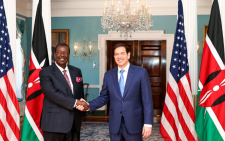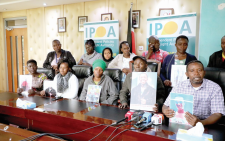Mudavadi tells agencies to seal avenues of graft

Prime Cabinet Secretary Musalia Mudavadi has warned Regulatory Authorities and Agencies (RAAs) of severe consequences should they be found engaging in corruption at the expense of service delivery.
He said RAAs must establish corruption prevention committees and mean business in the fight against graft and prudent utilisation of public resources.
Mudavadi made reference to the Ethics and Anti-Corruption Commission’s National Ethics and Corruption Survey 2023, saying it provides a template on the common loopholes in Ministries, State Departments and Agencies (MDAs) as a guideline to be adopted by all of them.
“I challenge all RAAs to also institute measures geared towards wiping our avenues for corruption in line with the lessons contained in the EACC report and template. They must not be dens of corruption or rent-seeking, they must carry out their core mandates effectively and in the national interest,” he said during the interactive and consultative conference to assess the status of the ongoing campaign to revitalise and re-energise RAAs at the Kenya School of Government in Mombasa, yesterday.
Mudavadi, also the Cabinet Secretary for Foreign and Diaspora Affairs, said there is an urgent need to address the issue of regulatory overlaps and duplication. This, he said, is a real problem for which a solution must be found soonest.
He said, in addition to the complexities posed by varying regulations at the county level, enterprises across the nation are confronted with a maze of conditions, requirements, fees, charges and levies imposed by multiple government agencies and regulatory bodies.
“Tough decisions will have to be taken to give effect to the merging of certain regulators. For instance, the manufacturing sector, where institutions such as the Kenya Bureau of Standards, the National Environment Management Authority (Nema), and Departments of Weights and Measures all assert their authority over aspects such as labelling and inspection. This overlapping mandate often leads to confusion and inefficiencies for businesses striving to comply with regulatory requirements,” he said.
Mudavadi also gave a series of other examples that include challenges in the food and beverage processing industry, the financial sector where there exists an overlap among regulatory bodies like the Capital Markets Authority, the Insurance Regulatory Authority, and the Sacco Societies Regulatory Authority. “Consolidating their functions under a unified framework would undoubtedly enhance their collective impact and streamline regulatory processes.”
Points out
In the realm of intellectual property protection, Mudavadi, pointed out that agencies such as the Kenya Industrial Property Institute, Kenya Copyright Board, and the Anti-Counterfeiting Agency all play distinct yet interconnected roles. By harnessing their expertise within a consolidated framework, we can eliminate redundancies and foster a more efficient system for safeguarding intellectual property rights.
In the aviation sector, the Prime CS said while the Kenya Civil Aviation Authority, is responsible for overseeing various aspects of civil aviation, including safety oversight, air navigation services, and aircraft registration. However, within the same domain, other entities such as the Kenya Airports Authority (KAA) and State Department of Transport also holds significant regulatory roles. While KCAA focuses on safety and regulatory compliance, KAA manages airport infrastructure and operations, where there is often a duplication of efforts and conflicting directives. “The examples above are not exhaustive and are by no means the only instances where there are actual and perceived overlaps. These examples are provided so that we can start a conversation on enhancing the efficiency and effectiveness of our RAAs,” said Mudavadi.
He said to steer the country towards the much-anticipated prosperity and progress, focus has to shift from mere policy directives to real action.
“It is imperative that we engage in candid self-assessment. Are we truly maximising our potential? Are the practices of RAAs aligned with the national interest? We cannot ignore the possibility that some regulatory practices may inadvertently impede business activities,” he noted.
Mudavadi acknowledged that the World Bank maintains an Ease of Doing Business Index, which Kenya has been steadily rising in.
He said focus must now shift from policy directives to action that emphasises on progressive change of livelihoods for Kenyans. Mudavadi said it is time for regulatory agencies to re-look and reflect internally, and effect reforms that will help steer the country forward.
-OPCS












